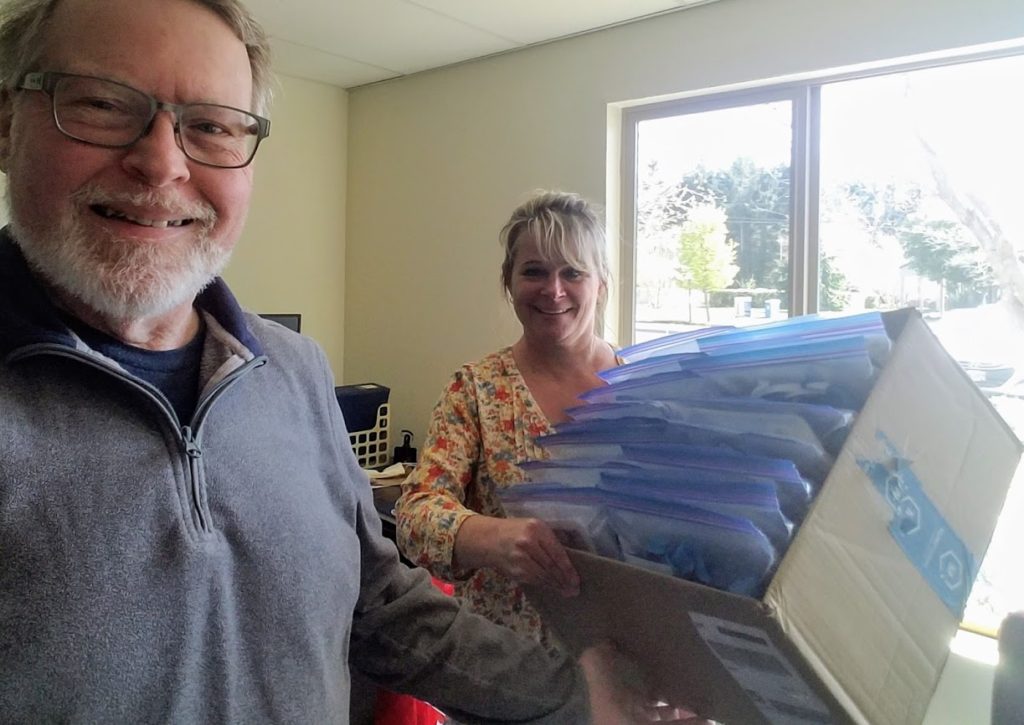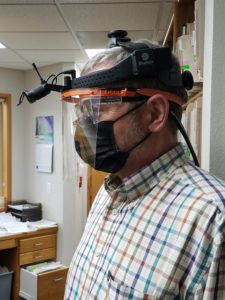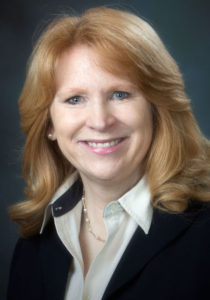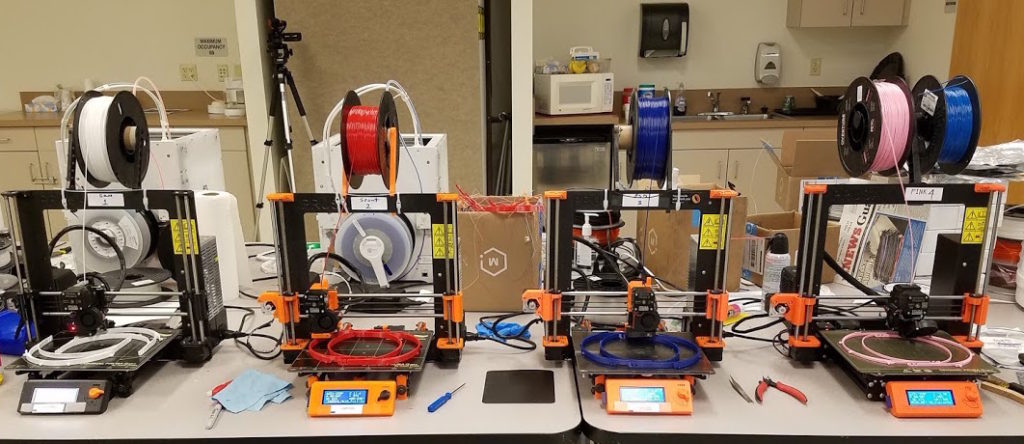
By DANA TIMS/YachatsNews.com
Lindsey Johnson, like so many others, had been reading all about the critical shortage of personal protective equipment facing first responders and other front-line workers helping to curb the wildfire spread of the coronavirus.
Unlike others, however, Johnson, a long-time Lincoln City cabinet-maker and designer, found himself in a position to do something about it.
Working up to 14 hours a day since late March, Johnson has marshaled his personal bank of three-dimensional printers to turn out more than 1,500 clear plastic face shields. The lightweight, reusable shields, when worn in conjunction with face masks, go a long way toward creating a virus-free environment for everyone from doctors and emergency medical technicians to dentists and salon operators.
“The whole process has been mind-blowing,” Johnson said. “And it just keeps moving.”

Johnson has been working with 3D printers at his Nautilus Design and Fabrication business in Lincoln City since 2007, when he purchased his first microwave-sized printers from an outlet in the Czech Republic.
So his interest was immediately piqued during a recent virtual town hall meeting, when Lincoln County hospital and medical professionals went on and on about the critical lack of so-called PPE materials.
The meeting came just days after Czech officials distributed to 3D printer aficionados worldwide a recipe for making hospital-grade clear face shields.
“I just said, ‘Whoa,’ I just read an article about this’,” Johnson told meeting participants.
Within days, he obtained approval from local infectious-disease experts for his proposed design. And just days after that, he delivered the first batch of 75 to Samaritan North Lincoln Hospital in Lincoln City.
From there, the effort only continued to grow.

Chris Chandler, working in a volunteer position with the Lincoln County Economic Development Department, heard the rave reviews the shields were garnering. She contacted Johnson, asking if he could help supply the county.
The idea was that the county, using flexible economic dollars derived from state-shared video lottery proceeds, would buy 1,000 face shields from Johnson at his cost of $10 per shield. The county would then distribute those shields to area chambers of commerce for re-sale.
The only restriction was that the price per shield could not exceed $10. In return, the chambers could keep the proceeds as a way to compensate in some small way for the massive amounts of money their members have lost during the pandemic-related business shutdown.
“The concern about businesses needing PPE for their employees as we work on reopening the economy is a very big deal,” Chandler said. “We see this public-private partnership as a very real way to address the horrible economic environment we’re seeing right now.”
In Johnson’s view, the manufacturing process itself, all this seeming 3D magic aside, is simple.

“It’s basically a hot-melt glue gun dispensing melted plastic and creating a shape,” he said. “Working from a computerized image of what you want to make, you cut the image and stack it up for a 3D shape.”
Johnson’s printers take about 2 1/2 hours to print two headbands, which close at the back with the type of tourniquet strap medical offices use to facilitate blood draws.
A separate machine, which Johnson uses in his cabinet-making business as a router, is re-fitted with a knife that cuts 4-by-8-foot sheets of plastic into 10-by-24-inch pieces – enough to yield three shields per piece.
The shields then snap into place along the front of the headbands. Unlike many flimsy, non-reusable on the market, Johnson’s can be sanitized for multiple uses.
“We did our own research and these just seemed to be so much better,” said Laura Furgurson, executive director of chambers of commerce in Waldport and Depoe Bay.
Chambers in Newport and Lincoln City also received shields for public resale. People can call any of those four chambers to get details on purchases, Furgurson said.
At this point, Johnson is ready to move out of the space he’s been using at Oregon Coast Community College in Newport and back into his own Lincoln City shop. But he’ll keep on producing shields as long as demand exists.
“Needless to say, I hope the need for us to make these ends sooner than later,” Johnson said. “We’re all looking forward to getting back to whatever normal might look like.”
— Dana Tims is a YachatsNews freelance reporter who can be reached at danatims24@gmail.com


